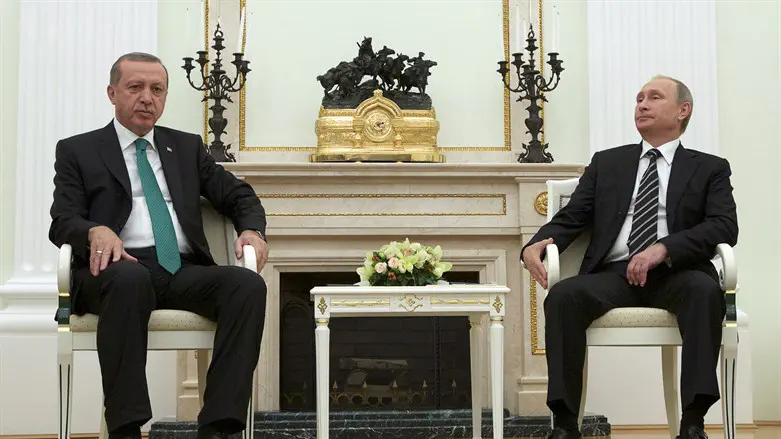
Despite the extremist rhetoric surrounding the war between Russia and Ukraine, particularly from the Ukrainian side, Ukrainian President Zelenskiy's adviser insists that finding common ground to end the conflict is "relatively easy" on some issues, at least.
In a speech to the Israeli Knesset on Sunday, Ukraine's President accused the Russians of attempting genocide against his countrymen, and the comparisons he made between the current conflict and the Holocaust enraged many Knesset members.
Nonetheless, presidential adviser Alexander Rodnyansky told Politico that compromise was certainly possible.
“The neutrality issue is something where we can find compromise in the sense that we have to have a security guarantee, a tangible security guarantee for Ukraine going forward,” he said, suggesting that it could be modeled on the Budapest Memorandum, the agreement according to which Ukraine gave up its nuclear weapons in exchange for security guarantees from the United States, Great Britain, and Russia – but “much more concrete,” he added.
“If we get [security guarantees], that would be sufficient at this point to say that we can delay our NATO ambitions, especially given the fact that NATO has said ‘no’ to us anyway. So that’s relatively easy, I would say,” Rodnyansky said.
“Changing the names of streets is also not a big issue,” he continued, referring to the Russian government’s demand that Ukrainian street names be “de-Nazified.” Streets in many of Ukraine’s larger and smaller cities are named after known Nazi sympathizers and murderous anti-Semites such as Stepan Bandera, whose Order of Ukrainian Nationalists massacred huge numbers of Jews during the Second World War. Ukraine also features streets named after Bohdan Khmelnytsky and statues of this infamous anti-Semitic murderer, and the Azov Brigade is an openly racist, anti-Semitic militia that is incorporated into Ukraine’s regular armed forces.
“They have to sell something to the Russian population,” Rodnyansky said. “But changing the names of the streets is not a big issue. So, we can do that. That’s really what they need to sell to their populace.”
Rodnyansky also suggested that allowing Russian to be recognized as a regional language was a “non-issue.”
“All of this is just Russian propaganda, but they need to sell something to the populace in the sense of ‘we had a win here,’” he said. “That’s a PR stunt on their part, but we can give them that if that means peace and sovereignty for us … I think these are relatively easy points.”
However, the “hardest part,” Rodnyansky said, would be related to the southern regions of Donetsk and Lugansk, where Russia has already recognized separatist claims. These areas are predominantly Russian-speaking and largely ethnic Russian, but Zelenskiy’s adviser insisted that giving up Ukrainian sovereignty anywhere in the country was not on the agenda.
“That’s the hardest part, obviously,” Rodnyansky said. “I mean, they went in to conquer the territory, to occupy our lands. And obviously, they’re not going to say, ‘OK, we’re just going to give up on this’ … There’s not going to be the hard points on the table. So, anything that relates to our sovereignty on territory, that’s of course not going to go anywhere.”
Rodnyansky also warned that negotiations could be a ruse on the part of the Russians, designed to “avert further sanctions by signaling to the West that ‘look, we’re close to a deal, and, therefore, no further sanctions are necessary.’ Because, you know, why stop buying oil and gas in Europe if everything’s going to be over in a minute?”
According to Turkish sources, however, the two sides are indeed moving closer to an agreement.
“Of course, it is not an easy thing to come to terms with while the war is going on, while civilians are killed, but we would like to say that momentum is still gained,” Turkish Foreign Minister Mevlut Cavusoglu said in live comments on Sunday, adding that nonetheless, “We see that the parties are close to an agreement.”
Cavusoglu added that his country was in contact with delegations from both Ukraine and Russia, but refused to provide details of the progress made.
In an interview with daily newspaper Hurriyet, however, Turkish Presidential spokesman Ibrahim Kalin listed six main issues under discussion: Ukraine’s neutrality, disarmament and security guarantees, “de-Nazification”, removal of obstacles on the use of the Russian language in Ukraine, the status of the breakaway republics in the Donbas region, and the status of Crimea.
Turkey has said in the past that it is ready to host a meeting between Zelenskiy and Russian President Vladimir Putin. “We are working day and night for peace,” Cavusoglu said.
President Recep Tayyip Erdogan has repeatedly said Turkey will not jettison its relations with either Russia or Ukraine, saying that its ability to speak to both sides was an asset.

